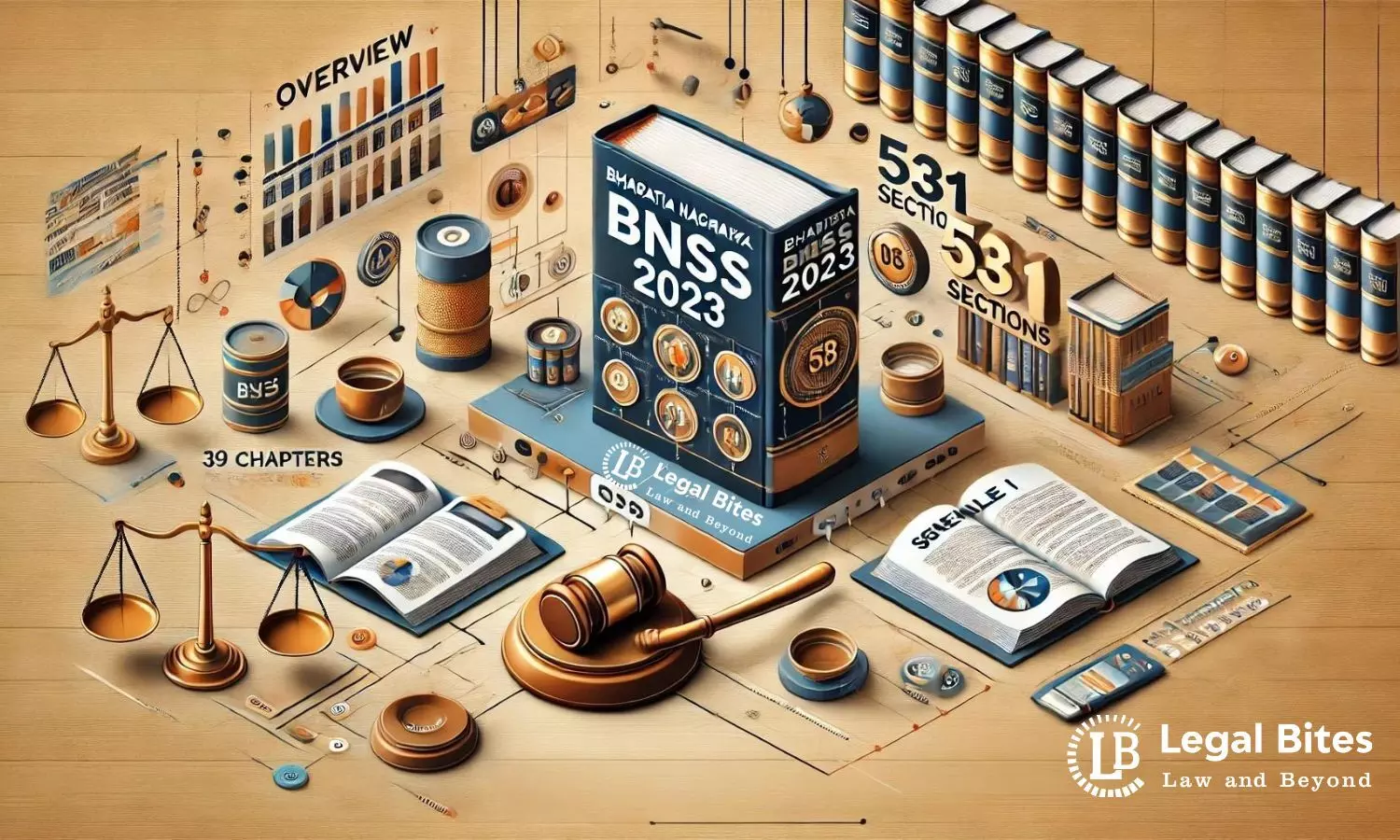Overview of Bharatiya Nagarik Suraksha Sanhita (BNSS) 2023
The Bharatiya Nagarik Suraksha Sanhita, 2023 (BNSS) is a comprehensive legislative Act designed to consolidate and amend the law relating to Criminal Procedure in India.

The Bharatiya Nagarik Suraksha Sanhita, 2023 (BNSS) is a comprehensive legislative Act designed to consolidate and amend the law relating to Criminal Procedure in India. This landmark Act received assent from the President of India on December 25, 2023, and will be enforced starting from July 1, 2024. The BNSS aims to modernize and streamline criminal procedures, ensuring a more efficient and effective justice system.Structure of the ActThe BNSS is meticulously structured into 39...
The Bharatiya Nagarik Suraksha Sanhita, 2023 (BNSS) is a comprehensive legislative Act designed to consolidate and amend the law relating to Criminal Procedure in India. This landmark Act received assent from the President of India on December 25, 2023, and will be enforced starting from July 1, 2024. The BNSS aims to modernize and streamline criminal procedures, ensuring a more efficient and effective justice system.
Structure of the Act
- Chapter Structure: The Act's XXXIX chapters cover various aspects of criminal procedure, from initial investigations to the execution of sentences.
- Schedule I: This schedule classifies offences under the Bharatiya Nyaya Sanhita, specifying whether an offence is cognizable or non-cognizable, bailable or non-bailable, and the court by which it is triable.
- Schedule II: This schedule includes 58 forms that are essential for the procedural operations under the BNSS.
Object and Need
- Streamlining Procedures: By consolidating various laws, the BNSS aims to eliminate redundancies and ambiguities, leading to a more streamlined criminal justice process.
- Modernization: The Act introduces modern procedural practices, such as the use of technology in investigations and trials, which are crucial for a fast-paced, digitally connected society.
- Enhanced Efficiency: With clearer guidelines and structured procedures, the BNSS seeks to enhance the efficiency of law enforcement agencies and the judiciary, ultimately leading to quicker and fairer justice delivery.
Related Resources
1. Index of Bharatiya Nagarik Suraksha Sanhita 2023, (BNSS) - NCRB
- Explore the detailed index of the BNSS 2023, provided by the National Crime Records Bureau, for an in-depth understanding of its structure and sections.
- Index of BNSS Available Here
2. BPR&D - Comparison summary BNSS to CrPC
- A comparative summary by the Bureau of Police Research and Development, highlighting the differences between the BNSS and the previous Code of Criminal Procedure (CrPC).
- Comparison summary BNSS to CrPC, Available Here
3. Standard Operating Procedure (SOP) for Preliminary Enquiry Under the BNSS
- Detailed SOP for conducting preliminary enquiries under the BNSS, ensuring procedural consistency and legal compliance.
- SOP for Preliminary Enquiry, Available Here
4. Standard Operating Procedure (SOP) Zero FIR & e-FIR
- Guidelines for filing Zero FIR and e-FIR, which are crucial for prompt and accessible justice delivery.
- SOP on Zero FIR & eFIR, Available Here
5. SOP of Audio Video Recording of Scene of Crime
- Procedures for audio and video recording of crime scenes to ensure evidence integrity and transparency in investigations.
- SOP of Audio Video Recording, Available Here
Law Aspirants Multiple Choice Questions on Bharatiya Nagarik Suraksha Sanhita
1. When was the Bharatiya Nagarik Suraksha Sanhita, 2023 given assent by the President of India?
2. When did the Bharatiya Nagarik Suraksha Sanhita come into force?
3. How many chapters are there in the Bharatiya Nagarik Suraksha Sanhita?
4. How many sections does the Bharatiya Nagarik Suraksha Sanhita contain?
5. What does Schedule I of the Bharatiya Nagarik Suraksha Sanhita deal with?
6. How many forms are included in Schedule II of the Bharatiya Nagarik Suraksha Sanhita?
7. Which of the following is NOT an objective of the Bharatiya Nagarik Suraksha Sanhita?
8. Which of the following schedules classifies offences under the Bharatiya Nyaya Sanhita?
9. How many forms are there in the second schedule of the Bharatiya Nagarik Suraksha Sanhita?
10. What is included in the SOP for Audio Video Recording of Scene of Crime under the Bharatiya Nagarik Suraksha Sanhita?
Answers

Mayank Shekhar
Mayank is an alumnus of the prestigious Faculty of Law, Delhi University. Under his leadership, Legal Bites has been researching and developing resources through blogging, educational resources, competitions, and seminars.
